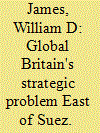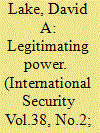| Srl | Item |
| 1 |
ID:
178501


|
|
|
|
|
| Summary/Abstract |
Why did Britain withdraw from its military bases in the Arabian Peninsula and Southeast Asia midway through the Cold War? Existing accounts tend to focus on Britain's weak economic position, as well as the domestic political incentives of retrenchment for the ruling Labour Party. This article offers an alternative explanation: the strategic rationale for retaining a permanent presence East of Suez dissolved during the 1960s, as policymakers realised that these military bases were consuming more security than they could generate. These findings have resonance for British officials charting a return East of Suez today under the banner of ‘Global Britain’.
|
|
|
|
|
|
|
|
|
|
|
|
|
|
|
|
| 2 |
ID:
187538


|
|
|
|
|
| Summary/Abstract |
The existing historiography on relations between Britain and the states of Lower Gulf after British withdrawal from ‘East of Suez’ in 1971 suggests that the former imperial power successfully established an informal role in the 1970s and beyond which amounted to empire in all but name. While Britain certainly sought to retain as much of its influence and as many of its interests in the economically important Lower Gulf as possible, an analysis of Anglo-Qatari relations after 1971 demonstrates that Britain’s former exclusive position was substantially eroded. British economic weakness, fierce competition from Britain’s industrial rivals, and the encroachment of the Arab world into the affairs of Qatar all militated still further against the preservation of British influence and interests, let alone the establishment of an informal imperial relationship with Qatar.
|
|
|
|
|
|
|
|
|
|
|
|
|
|
|
|
| 3 |
ID:
124375


|
|
|
|
|
| Publication |
2013.
|
| Summary/Abstract |
The United States has maintained international hierarchies over the Western Hemisphere for more than a century and over Western Europe for nearly seven decades. More recently, it has extended similar hierarchies over states in the Middle East. How does the United States exercise authority over other countries? In a world of juridically sovereign states, how is U.S. rule rendered legitimate? Hierarchy has interstate and intrastate distributional consequences for domestic ruling coalitions and regime types. When the gains from hierarchy are large or when subordinate societies share policy preferences similar to those of the United States, as in Europe, international hierarchy is possible and compatible with democracy. When the gains from hierarchy are small and the median citizen has policy preferences distant from those of the United States, as in Central America, international hierarchy requires autocracy, and the benefits of foreign rule will be concentrated within the governing elite. In the Middle East, the gains from hierarchy also appear small, and policy preferences are distant from those of the United States. As a result, the United States has backed sympathetic authoritarian rulers. Although a global counterinsurgency strategy might be viable over the long term, the costs of establishing effective hierarchies in the region imply that the United States is better off retrenching "East of Suez."
|
|
|
|
|
|
|
|
|
|
|
|
|
|
|
|